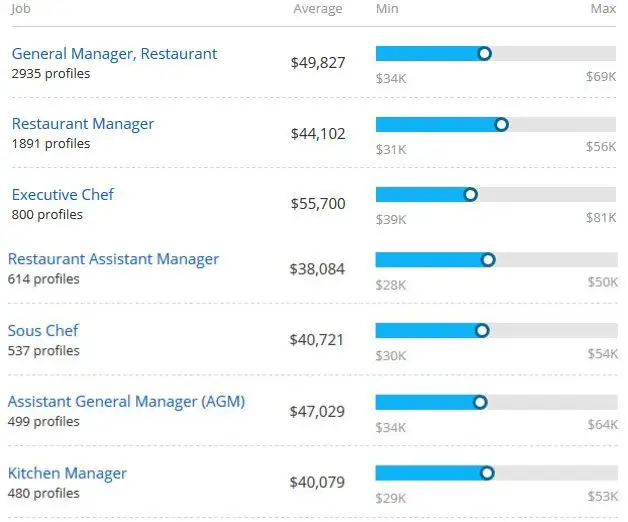How to become a Chef
This article provides in-depth information into What is a Chef? What Chefs do? Degrees for Chef, Steps to become Chef and much more.
A chef is someone who is in charge of the kitchen in restaurants and other places where food is served. Here are some simplified and detailed steps to become a chef sooner.
What does a Chef do ?
His major responsibilities include menu planning, pricing, meal preps, ensuring good quality of service, maintaining hygiene, and following all the safety rules and regulations.
Apart from the responsibilities mentioned above, the chef is responsible for training sous chefs and kitchen assistants. A chef will supervise any and all food preparation and often does the final garnishing and presentation. A chef is also responsible for developing new recipes.
Steps for becoming a Chef
1
Get A Job In A Restaurant
If you are really interested in cooking and have figured out your career goal early in life, you can apply for a summer job during your senior high. This will give you a fair idea about how commercial kitchens and restaurants work. As your first job, you will be expected to mundane things like taking out the trash and washing dishes. What should matter is the exposure to professional kitchens you get during this period. This time toiling will also give you time to rethink your career goals: to or not to.
2
Get A High School Diploma
One of the prerequisites to get into a culinary school is a high school diploma. Sometimes employers only hire those who have already shown that they can pursue their dreams without any fluctuations. Know that most apprenticeship programs require a minimum of a high school diploma or GED.
3
Go To Culinary School
While formal education isn’t mandatory to become a chef, a degree gives you an edge over those that don’t have one. Formal education equips you with the specialized knowledge and skills that serve as good stead in honing skills in a real kitchen. Formal education accelerates the process of success. Depending on the program, culinary schools take anywhere between one to four years to be completed. The most common degrees pursued are diploma, associate degree, or bachelor’s degree.
4
Obtain Practical Experience
Degree from a culinary school will give you theoretical knowledge. You gain practical knowledge only once you start working. You need to have a great deal of experience in order to become a chef. A fresh graduate has to go through additional training under the guidance of a professional chef through an internship, apprenticeship or simply through everyday jobs. This will help you enhance your skills and knowledge and help broaden your network.
5
Move On To Move Up
Your first working establishment shouldn’t be the last place where you retire. It is important to work at a variety of restaurants before settling for the final one. The more experience you gain, the better it is for a chef’s career. Working at different types of restaurants will help diversify your resume and gain a variety of skills.
6
Obtain Certification
Certifications help market a chef’s cooking abilities and open more avenues for new opportunities. There are 14 certifications available in five areas under the American Culinary Federation (AFC) based on a candidate’s educational and work experience. They are - Baking and Pastry Professionals, Cooking Professionals, Culinary Administrators, Culinary Educators, and Personal Cooking Professionals.
Chef Degree Levels
Certificate
A certification or diploma is the best and fastest way to get trained in the field of cooking. It typically takes up to a year to complete a certification course. These types of courses are quite intense and focus purely on hands-on training. General diplomas and certificates prepare you for entry-level jobs in a commercial kitchen. There are other certificate programs that are specially designed for working professionals who wish to expand their knowledge base and provide intensive training in a particular area of culinary arts. Some of the most common culinary certifications include baking and food science.
Baking
-
Create dough and various bread
-
Basics of preparing pastries, pies, cookies etc
-
Baking techniques for producing on a large scale
Objectives
-
Identify and explain baking terms
-
Ingredients, equipment, and tools
-
Employ safe food handling practices
Food science
-
Focus on how ingredients react
-
Method of food preparation
-
Factors that affect the taste
Objectives
-
Understand basic food safety issues
-
Develop and evaluate the quality of food products
-
Food chemistry and food analysis
Culinary Skills
-
A detailed study of the equipment’s in kitchen
-
Specific tools and cooking techniques
-
Food sanitation procedures
Objectives
-
Common cooking methods
-
Tools used for creating a variety of dishes
-
Principals of sanitation and personal hygiene
Associate
An associate degree is the most popular and sought after to obtain a culinary degree. It is mostly offered at community colleges and culinary skills, provides a general education foundation in math, communications, English alongside the obvious culinary training. It is a two-year degree program. Students learn to prepare classic dishes in all categories including pastries, seafood, and international cuisines. Wine studies are included to impart a general understanding of gastronomic pairings. Graduates can pursue their career in culinary arts after completion of their degree or use it as a stepping stone for further studies.
International foods
-
Prepare international dishes
-
Using correct ingredients
-
Methods and tools used for preparation
Objectives
-
Non-conventional and culture-specific cooking methods
-
Requisitions for test menus
-
Standardized recipes
Food safety
-
Teaches the importance of sanitation protocols
-
Education about avoiding food-borne illnesses
-
Applicable local laws and ordinances will also be discussed
Objectives
-
Produce clean, safe food
-
Importance of personal hygiene
-
Prevent contamination from equipment
Food Procurement
-
How to acquire ingredients
-
Understanding of food purchasing
-
Methods to provide a steady supply of ingredients
Objectives
-
Identify proper ingredients
-
Market factors affecting cost and availability
-
Mechanics of purchasing
Bachelors
For those that want to get into the hospitality industry or want to understand the workings of a restaurant may opt for a bachelor's degree. About half of the curriculum will cover culinary topics while the remaining half will delve into management-related training and concepts. A Bachelor’s program will typically take four years to complete. A bachelor’s degree is a significant achievement and is rewarded within the culinary and hospitality industry. The other career options include food designers, menu developers, food photographers among many others. Dieticians and nutritionists are the new entrants that fall within the realm of the food industry.
Table Service
-
Supervision of dining room employees
-
Proper equipment and settings
-
Dining room operations and procedures
Objectives
-
Use of correct flatware placement
-
Correct glassware placement
-
How to properly greet guests
French Cuisine
-
Traditional French cooking styles and ingredients
-
The history of French cuisine
-
How to make classic French dishes
Objectives
-
French cooking methods
-
Express likes and dislikes
-
Order food and drinks
Introduction to Marketing
-
The basics of marketing concepts
-
Apply the above principles to the food service and restaurant setting
-
Menu development and course selection
Objectives
-
Customer service techniques
-
External marketing tactics
-
Market mix components
Job concentrations for a chef
Following are the Job concentrations to consider -
Dessert
Desserts taste delicious and why not? The techniques that go behind making them are not as simple. In fact, high-end restaurants have chefs devoted solely to the desserts section. The most common concentrations in dessert section are
Pastry Chef: A pastry chef specializes in the techniques and ingredients required for making desserts, bread and other baked items.
Chocolatier: As a chocolatier, you will specialize in making a variety of desserts, chocolates, and candies with chocolate. A chocolatier usually will start his career as a pastry chef and then gradually move on to study the techniques and procedures and specialize to become a chocolatier.
Cooking:
As the name suggests, cooking purely delves into the actual art of making food. The following are the concentrations to consider:
Sous Chef: The second in command to a chef in the kitchen is known as Sous Chef. One of the merits of pursuing a bachelor’s degree is you can directly become a sous chef and don’t have to climb the hierarchical ladder much. In the absence of the executive chef, a sous chef heads the kitchen.
Saucier: A saucier specializes in making stews, sauces, appetizers, and sauteing a food. Saucier comes third in the hierarchy just after the exec chef and the sous chef.
Management:
As the name suggests, professionals in management focus on the business aspects of the restaurants
Restaurant Manager: As a restaurant manager, you will be responsible for the overall operations and management of the restaurant starting from staff hours and duties to controlling budgets and ordering supplies, equipment, ingredients among others. There’s a huge demand for restaurant managers with a formal degree in high-end restaurants.
Executive Chef: The exec chef is the head of the kitchen and is responsible for everything that goes behind the scenes of cooking food. To become an exec chef is not a one day task. You will have to work towards it.
Specialty:
For chefs who do not work in commercial kitchens full time but work for individual clients or cook only for special locations at a specific location.
Catering: A caterer is someone who prepares food and then brings the food to an alternate location. Although there are no formal requirements for becoming a caterer, having knowledge about how to prepare and transport large amounts of food efficiently and safely is imperative to success.
Personal Chef: A personal chef is someone who works for a particular client using the client’s facilities like kitchen, equipment, tools, etc. It requires several years of education and experience in catering, culinary arts, and meal prep.
How to Prepare Yourself for a Career as a Chef?
You don’t need to have a formal degree if you want to be a chef. However, if you have the ability and access to get a formal degree, make sure to reap the benefits. A formal degree in culinary arts will enable you with skills and techniques related to cooking and the hospitality industry that can’t be found anywhere else. It will also help you climb the ladders of success inside a commercial kitchen at a faster rate.
Culinary Schools: Culinary schools focus on one primary thing- how to become a chef. There will be other subjects that will help you prepare better for the practical world. This can take anywhere from one to four years to be completed. The high quality of faculty, training, and updated facilities makes up for the high tuition fee
Community College: For those that want to get an associate degree in culinary arts, community college is the best place. The main difference between community colleges and culinary schools in the tuition fee. The tuition fees in community colleges are cheaper and much more affordable.
Vocational / Trade Schools: One of the quickest ways to obtain a degree in culinary arts is by attending a program in a vocational or trade school. Some courses are designed for high school graduates to enable them with a specific set of culinary skills and some of these programs are designed for junior high and senior high students which will provide an edge over others in bachelors.
4-year schools: the curriculum for a 4 years bachelor’s degree in culinary arts is quite comprehensive in nature. Students will learn about the fundamentals of management, marketing and business in general along with the various culinary skills.
Stand out skills to become a chef
You can obtain a degree, get a job, or have your own kitchen. But there is a fine line between being just a chef and being a chef who others look up to. Following skills will help you stand apart from the rest of the crowd:
Creativity: As a chef, you should be able to develop new recipes and techniques for cooking food. Some of the best chefs in the industry allow their creativity and personality to shine through in every new dish that they develop. You will also be required to up your presentation game. You will have to invent new ideas for food presentation that will inspire other chefs and make it irresistibly appetizing for the customers.
Team Player: It is almost impossible to work as a lone wolf as a chef in a kitchen. Turning out plate after plate of good quality food in a busy commercial kitchen requires an entire team right from dish cleaning help to other chefs to servers.
Detail Oriented: A good chef will have an eye for detail. Right from developing a recipe to plating the food, the detail is a critical component that will help a chef stand out. You need to have a sharp focus and know what needs your undivided attention.
Endurance and Stamina: A chef will be required to work for long hours starting from mid-morning to late hours of the night most of the time. This can become challenging for the most physically fit chef too. However, this is not something unexpected and hence a good chef should be mentally and physically prepared to withstand such adversities.
Undying Passion: Usually a chef will be required to work longer hours than most of the profession. And hence, unless a chef is truly passionate about their craft, they might not be able to sustain for long. To be a good chef, you will have to be passionate about food and cooking in general so that you constantly come up with new methods of cooking and food preps.
Leadership: Jobs in the restaurant industry are stressful and can take a toll on your mental health. A good chef will have to showcase leadership qualities that will bind the entire team together. He should take responsibility and lead the team in both good and bad times.
| Minumum Credit Score | Apply in as little as | Variable APR | Fixed APR | ||
|---|---|---|---|---|---|
 | Not Available | 15 minutes or less | 2.95 | 4.74 | View disclosures |
 | 620 | 2 minutes | 5.38%-16.99%1 | 4.43%-16.99%1 | View disclosures |
 | Not Available | 15 minutes | 1.13% - 11.23%¹ (with autopay) | 3.50% - 12.60%¹ (with autopay) | View disclosures |
